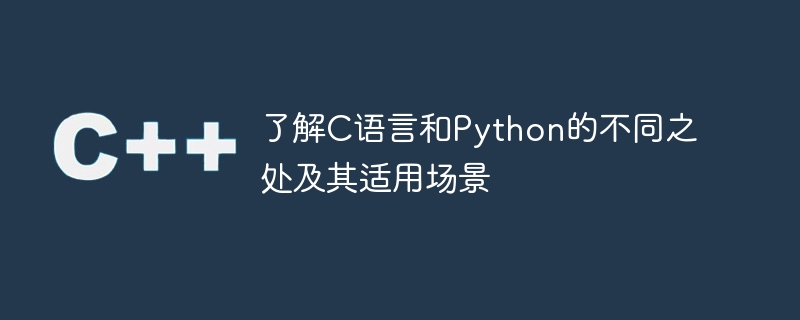Home >Backend Development >C++ >Understand the differences between C language and Python and their applicable scenarios
Understand the differences between C language and Python and their applicable scenarios
- WBOYWBOYWBOYWBOYWBOYWBOYWBOYWBOYWBOYWBOYWBOYWBOYWBOriginal
- 2024-03-22 11:51:041260browse

C language and Python are two popular programming languages. They have their own characteristics and are applicable to different scenarios. This article will introduce the characteristics of C language and Python and their applicable scenarios respectively, and demonstrate the differences between them through specific code examples.
1. Characteristics and applicable scenarios of C language:
C language is an efficient programming language, mainly used for system-level programming and embedded development. It has the characteristics of fast speed, flexibility, and strong access control to hardware. C language code can be directly run on the hardware after being compiled into machine code, so C language is often chosen in projects with high performance requirements. The following is a simple C language sample code:
#include <stdio.h>
int main() {
int sum = 0;
for (int i = 1; i <= 100; i++) {
sum += i;
}
printf("The sum is: %d
", sum);
return 0;
}2. Characteristics and applicable scenarios of Python:
Python is a high-level programming language with concise syntax, easy to read and write. Ideal for rapid development and prototyping. Python has rich third-party library support and is suitable for use in data analysis, artificial intelligence, web development and other fields. Python code does not require compilation and is cross-platform. The following is a simple Python sample code:
sum = 0
for i in range(1, 101):
sum += i
print("The sum is: ", sum)3. Differences between C language and Python and comparison of applicable scenarios:
- Performance: The performance of C language is worse than Python. It is suitable for scenarios that require high execution speed; although Python performance is not as efficient as C language, it is more suitable for scenarios that require rapid development and high readability requirements.
- Hardware operation: C language can directly operate hardware and is suitable for writing drivers and embedded development; Python is generally used for application layer development and is not suitable for direct operation of hardware.
- Ecosystem: Python has rich third-party library support and is suitable for tasks such as data processing and web development; while C language has relatively few libraries and is usually used for system-level programming and scenarios with high performance requirements. .
Summary: C language and Python each have their own advantages. Choosing the appropriate programming language depends on the specific project needs. If you need high-performance system-level programming or direct operation of hardware, choose C language; if you need rapid development, easy reading and writing, and rich third-party library support, choosing Python is more appropriate.
The above is the detailed content of Understand the differences between C language and Python and their applicable scenarios. For more information, please follow other related articles on the PHP Chinese website!
Related articles
See more- What are the rules for variable names in C language?
- What does the Python language use to distinguish code levels?
- What are the advantages, disadvantages and applicable scenarios of iterators and generators in Python?
- Analyze the advantages, disadvantages and applicable scenarios of HTML fixed positioning
- Explore the advantages and applicable scenarios of Oracle and Sybase in enterprise applications

